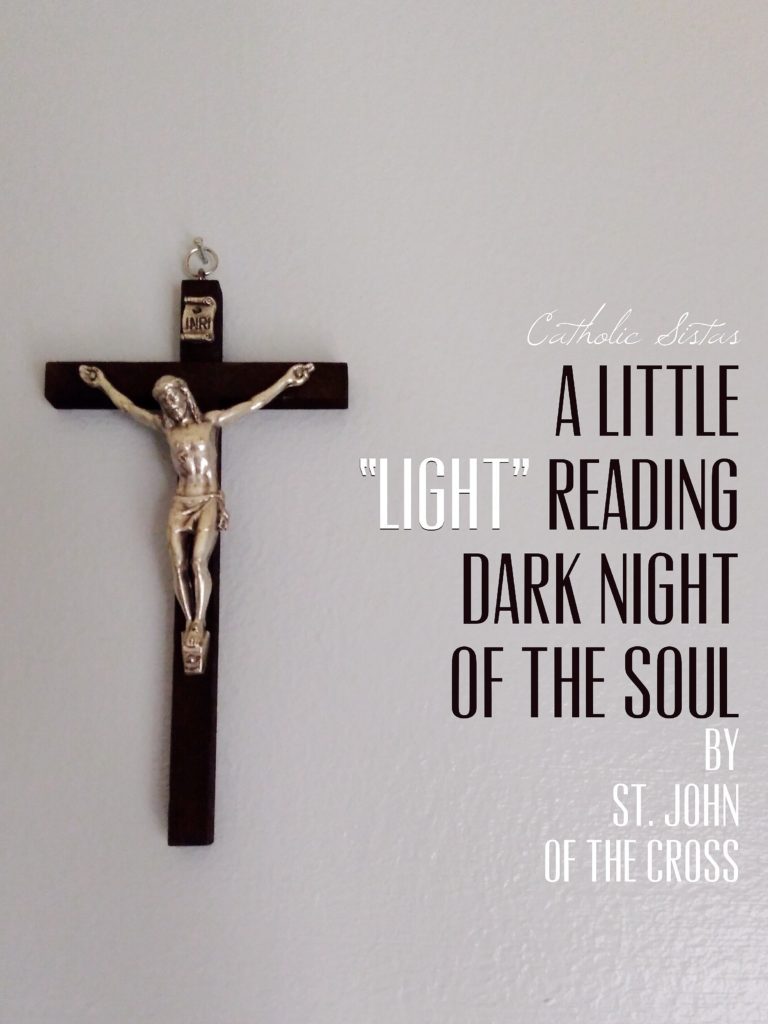
I have taken a different approach to Lent this year. Normally, I give up one or two things, and by “give up” I mean to say that I will give them up and ultimately fail, then do my best to ignore the rest of Lent with as little guilt as possible. It’s been rough. But, as Lent approached this year I felt called to do something else. I decided I would not give any “thing” up. Instead, I would read Dark Night of the Soul by St. John of the Cross and be open to recognizing the intangible attachments that require purgation. The result? This is the best Lent of my life. It is telling, and hard, and necessary.
As we near the close of the Lenten season, I am still in the thick of the text, with about 80 pages left to go. But…I’m starting to finally get it…the purpose of this liturgical season, the reason for it occurring every year, its calendar position right before Easter. These were all things I always understood on a superficial level, but now it makes so much sense. Now, I see that it is a gift. Now, I see how special it is that the Church offers this season each year. It is an invitation. God is tenderly asking us to seek union with Him (contemplation) by becoming purified, so we may participate in Christ’s Resurrection (eternal life).
I could write pages upon pages of my reaction to St. John’s writing, but this is not the place for it. All I will say is that I would encourage everyone to read or re-read it when the time seems right, during Lent or not. To conclude, I will offer some highlights of my reading so far and why the timing is awesome.
Four Reasons This is the Perfect Book to Read During Lent
- St. John outlines the imperfections which are common for beginners based on the capital sins. He addresses the sins in the spiritual context as the soul struggles in the beginning of its pursuit of God. This has been a helpful guide to point out which of my sins I ought to focus on first and to ask that my soul truly be open to becoming purged of them.
- He clarifies contemplation, a concept that has intimidated and confused me up until now. He defines it multiple times in similar terms. My favorite is, “Contemplation is nothing else but a secret, peaceful, and loving infusion of God, which, if admitted, will set the soul on fire with the spirit of love.” He frequently reminds the reader of the beautiful potential of a soul being purified for union with God. During Lent, we must not forget that eternal fruit is born through sacrifices and contrition. Eyes on the Prize.
- He speaks of the reason for pain during the purification of the soul. He does not simply acknowledge that the soul must suffer as it becomes more perfect, but he lovingly explains why it must be so. Here’s a tidbit: “…there is nothing in contemplation and the divine inflowing, to cause pain, but rather much sweetness and joy, as the soul will find later. The cause is the imperfection and weakness of the soul, and dispositions not fit for the reception of this sweetness. And so, when the divine light beats upon the soul, it makes it suffer in the way described.” Lent is not a bummer—my imperfect soul is!
- Several times he illuminates passages in Scripture that l have often skimmed over throughout the years. I particularly love his attention to Job and David. St. John uses the words of these tested men of faith to illustrate the state of their own souls during their respective dark nights. Their words clarify his meaning, and his explanations bring life to their words. Letting Scripture sink in on a more personal level for the rest of Lent and beyond motivates me, during private prayer and at Mass.
I pray that this approach to Lent and reading Dark Night of the Soul helps me and others to truly rejoice in Christ’s Resurrection. I may reread it in some capacity each Lent. Perhaps it would make an excellent text for a Lenten Book Club!
